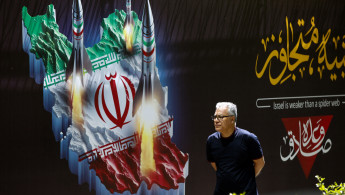Israel's attack on Iran and Syria: what we know so far
Israel has reportedly targeted Iran and Syria with attacks early on Friday following days of threats of retaliation from Israeli leaders following Tehran's large-scale drone and missile salvo last weekend.
Three "micro air vehicles" were sighted in the skies above Iran's Isfahan province at around 4am local time.
Explosions were then heard when the three drones were taken out by anti-aircraft batteries, Iran's semi-official Mehr News Agency reported.
Iranian air defence systems in the Vadi-e-Rahmat region of Tabriz also fired at a "suspicious flying object", the report added.
Iran's Fars news agency said that "three explosions" were heard near Qahjavarestan, near Isfahan airport and the 8th Shekari army airbase.
Over in Syria, an Israeli missile strike targeted an air defence unit in the south and caused material damage, Syrian state news agency SANA reported on Friday.
The scale and method of these assaults remains unclear but it is being widely regard as Israel's first military response to last weekend's attack.
Iran reports 'No damage'
The UAVs were reportedly 'quadcopters' known to be used by Israeli military and were sighted not far from a major air base and nuclear facility near the city of Isfahan.
No damage or injuries have been reported and local media said on Friday that the city is "completely calm and secure".
The state television broadcaster IRIB showed footage of a seemingly normal activity in central Isfahan on Friday morning and reported that no explosion had been seen on the ground in the city.
Local media reported that students in Isfahan were organising a demonstration in solidarity with Gaza on Friday.
The International Atomic Energy Agency said there was no damage to Iran's nuclear sites and called for "extreme restraint from everybody".
In anticipation of an attack, Iran closed its nuclear installations on Monday.
The country's airspace and Tehran, Shiraz and Isfahan airports temporarily closed and flight tracking websites showed airplanes diverting routes away from the country early this morning.
UAE budget airline FlyDubai announced it had cancelled all flights to Tehran on Friday.
IAEA can confirm that there is no damage to #Iran’s nuclear sites. DG @rafaelmgrossi continues to call for extreme restraint from everybody and reiterates that nuclear facilities should never be a target in military conflicts. IAEA is monitoring the situation very closely. pic.twitter.com/4F7pAlNjWM
— IAEA - International Atomic Energy Agency ⚛️ (@iaeaorg) April 19, 2024
Has Israel claimed the attack?
So far, there have been differing narratives from US, Israeli and Iranian officials.
No official comment has come from Tel Aviv but Israeli officials cited in the New York Times on Friday confirmed that the military had carried out an operation on Iran.
CBS News reported that Israeli "missiles" had hit a site in Iran, citing a US official.
Iranian media seem to be down playing the significance of the incident, pushing back on early US reports which suggested a missile attack.
Later on Friday morning, Iranian officials suggested that the small drone infiltration had been carried out "possibly launched from inside Iran".
Reuters quoted a senior Iranian official, on condition of anonymity, who said there is no plan for immediate retaliation and that it was not clear yet who was responsible for the incident.
"The foreign source of the incident has not been confirmed. We have not received any external attack, and the discussion leans more towards infiltration than attack," the official said.
The ramifications of the strike on the Syrian base are still developing. Considering Israel's precedent of targeting Iranian-linked assets in Syria and geographical location it is likely that the assault would have caused a greater impact.
US President Joe Biden had urged Israel not to retaliate for the missile and drone attack last weekend and instead "take the win". Israel's iron dome defence system alongside US, UK, Jordanian and French air forces intercepted 99 percent of the Iranian air assault.
The direct attack came in response to an Israeli strike on 1 April which wiped out an Iranian consulate building in Damascus and killed seven members of the Islamic Revolutionary Guard.
Israel and Iran have long played out a shadow war through indirect attacks on military assets but hostilities across the region have ramped up in the wake of the Gaza war.




 Follow the Middle East's top stories in English at The New Arab on Google News
Follow the Middle East's top stories in English at The New Arab on Google News


![A group of Palestinians, foreign and Israeli activists gather to participated in an olive picking event on the land in the town of Battir, which is under threat of confiscation by Israel in Bethlehem, occupied West Bank on 8 November 2024. [Getty]](/sites/default/files/styles/image_330x185/public/2182930803.jpeg?h=199d8c1f&itok=__0LgGsa)